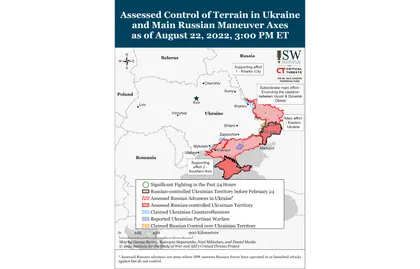Key Takeaways
- Russian-backed occupation authorities in Zaporizhia Oblast have obliquely declared the independence of the occupied areas of the oblast by falsely identifying Ukrainian citizens entering from unoccupied Ukraine as temporary asylum seekers.
- Russian forces conducted localized spoiling attacks southwest and southeast of Izyum.
- Russian forces continued ground attacks southeast of Siversk and northeast and south of Bakhmut.
- Russian forces continued attempts to advance from the northern and western outskirts of Donetsk City and conducted limited ground attacks southwest of Donetsk City.
- Russian forces made marginal gains along the Mykolaiv-Kherson line.
- Ukrainian intelligence stated that the Luhansk People’s Republic (LNR) will start “general mobilization” processes on September 1.
- Prymorsky Krai announced the formation of a new repair and service volunteer battalion.
- Ukrainian partisans continued to conduct attacks against Russian forces in occupied Melitopol.
Russian occupation officials in Zaporizhia Oblast have obliquely declared the region’s independence from Ukraine by falsely identifying Ukrainian citizens entering the occupied region as temporary asylum seekers. Head of the Zaporizhia Oblast occupation administration Yevheny Balitsky signed an order that designates Ukrainian citizens arriving in occupied Zaporizhia Oblast as temporary asylum seekers based on Russian law.[1] The order requires the registration of Ukrainian and Russian citizens based on their place of residence or place of arrival in the Russian-occupied parts of Zaporizhia Oblast and requires the distribution of temporary identification forms for all “stateless persons.” Ukrainians and Russians may register if they present proof of their temporary asylum application. This decree has various implications under both international law and domestic Russian law. International law states that a refugee is an individual from outside the country (or who is stateless) who is seeking “temporary asylum” in another country to escape persecution.[2] Russian law defines a refugee as a person ”who is outside of his/her country of nationality or habitual residence.”[3] Neither of these statuses properly apply to the majority of people crossing from unoccupied Ukraine into occupied Zaporizhia.
JOIN US ON TELEGRAM
Follow our coverage of the war on the @Kyivpost_official.
Russian occupation authorities are thus falsely classifying all Ukrainians entering occupied territories in Zaporizhia Oblast as refugees escaping persecution in Ukraine. The order also de facto identifies Ukraine as a separate country from the Zaporizhia Oblast entity, as defined by the occupation authority. By classifying all Ukrainians as refugees, Russian occupation authorities are establishing a new legal category that might have its own restrictions. Russian occupation authorities may use the refugee status to restrict Ukrainians who temporarily return to occupied territories after evacuating from them. The order will likely affect Ukrainian citizens traveling to occupied Kherson Oblast via the checkpoint in Vasylivka, Zaporizhia Oblast, as the order requires the registration of individuals at the point of arrival in the occupied Zaporizhia Oblast, and Vasylivka is the checkpoint serving Kherson as well as Zaporizhia Oblasts.

The Wishful Diplomacy of Mad Medvedev – When Progress Isn’t
Authors: Kateryna Stepanenko, Karolina Hird, Grace Mappes, Layne Philipson, George Barros, and Frederick W. Kagan
See the full report here.
You can also highlight the text and press Ctrl + Enter










